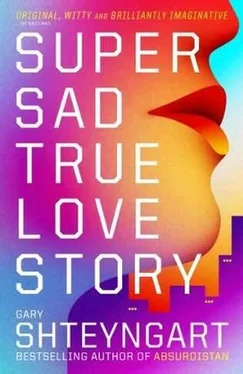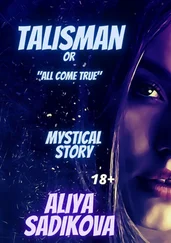On page eight, I read a part I had underlined as a moody, unlaid teenager. “What happens but once… might as well not have happened at all. If we have only one life to live, we might as well not have lived at all.” Next to this I had written in shaded block letters: “EUROPEAN CYNICISM or VERY SCARY TRUTH???” I re-read the lines again, slowly, with emphasis, directly into Eunice’s pert, wax-free ear, and as I did so I wondered if perhaps it was this book that had launched my search for immortality. Joshie himself had once said to a very important client, “Eternal life is the only life that matters. All else is just a moth circling the light.” He had not noticed my standing by the door to his office. I returned to my cubicle in tears, feeling abandoned to nothingness, moth-like, yet stunned by Joshie’s unusual lyricism. The part about the moth, I mean. He never talked like that with me. He always underlined the positive things about my brief existence, the fact, for example, that I had friends and could afford good restaurants and was never completely alone for very long.
I read on, feeling Eunice’s solemn breath against my chest. The main character, Tomas, started having sex with many attractive Czech ladies. I re-read several times a passage about Tomas’s mistress standing in front of him, in panties and bra and a black bowler hat. I pointed to the black bowler hat on the cover. Eunice nodded, but I felt that Kundera had put too many words around the fetish for her to gain what her generation required from any form of content: a ready surge of excitement, a temporary lease on satisfaction.
By page sixty-four, Tomas’s girlfriend Tereza and his mistress Sabina are taking photographs of each other naked, dressed only in that recurring black bowler hat. “She was completely at the mercy of Tomas’s mistress,” I read two pages later, winking at Eunice. “This beautiful submission intoxicated Tereza.” I repeated the words “beautiful submission.” Eunice stirred. She took off her TotalSurrenders with a snap of her finger and moved up to straddle my face between her legs. With the book still partly open in one hand, I cupped her behind with the other while using my tongue in the familiar motions against her opening. She pulled back for a while and let me look into her face. I mistook her expression for a smile. It was something else, a slight opening of the mouth, with the lower lip leaning rightward. It was astonishment: the astonishment of being fully loved. The miracle of not being hit. She returned to her position on top of me and let out a volley of grunts of a pitch and treble I had never heard. It was as if she were speaking a foreign language, one that had not kept up with history, one that was stuck on the primal sound “guh.” I lifted her up, not sure she was enjoying herself. “Should we stop?” I asked. “Am I hurting you?” She forced herself down on my face and rocked her body faster.
Afterward, she returned to her perch on my collarbone, sniffing critically at the trail she had left on my chin. I read once more. I read loudly about the exploits of the fictional Tomas and his many lovers. I skipped around, looking for juicier bits to feed Eunice. The story moved from Prague to Zurich and then back to Prague. The little nation of Czechoslovakia was torn to shreds by the imperialist Soviets (who, the author had no way of knowing at the time of writing, would themselves be torn to shreds a negligible twenty-three years later). In the book, characters had to make political decisions that, in the end, meant nothing. The concept of kitsch was rightfully, if somewhat ruthlessly, attacked. Kundera forced me to ponder my mortality some more.
Eunice’s gaze had weakened, and the light had gone out of her eyes, those twin black orbs usually charged with an irrepressible mandate of anger and desire.
“Are you following all this?” I said. “Maybe we should stop.”
“I’m listening,” she half-whispered.
“But are you understanding ?” I said.
“I’ve never really learned how to read texts,” she said. “Just to scan them for info.”
I let out a small, stupid laugh.
She started to cry.
“Oh, baby,” I said. “I’m sorry. I didn’t mean to laugh. Oh, baby.”
“Lenny,” she said.
“Even I’m having trouble following this. It’s not just you. Reading is difficult. People just aren’t meant to read anymore. We’re in a post-literate age. You know, a visual age. How many years after the fall of Rome did it take for a Dante to appear? Many, many years.”
I blubbered on like this for a few minutes. She went to the living room. Alone, I threw The Unbearable Lightness of Being across the room. I wanted to tear it to pieces. I touched my chin, still wet with her. I wanted to run out of the apartment, into the impoverished Manhattan night. I missed my parents. In times of trouble, the weak seek the strong.
In the living room, Eunice had opened up her äppärät and was concentrating on the last shopping page stored in its memory before communications collapsed. I could see she had instinctively opened a LandOLakes Credit Payment stream, but every time she tried to input her account info, she ended up throwing her head back as if stung. “I can’t buy anything,” she said.
“Eunice,” I said. “You don’t have to buy anything. Go to bed. We don’t have to read anymore. We don’t have to ever read again. I promise. How can we read when people need our help? It’s a luxury. A stupid luxury.”
When the morning light was at full blast, Eunice finally curled up next to me, covered in sweat, defeated. We ignored the morning and we ignored the day. We ignored the following day as well. But when I woke up on the third day, the heat raking its way through the opened window, she was gone. I ran into the living room; no Eunice. I ran to the lobby. I asked the loitering old people about her whereabouts. I could feel my heart stopping and the blood draining from my feet and hands.
When she finally showed up, twenty hours later (“I went for a walk. I needed to get out of here. It’s not that dangerous, Lenny. I’m sorry if you were worried”), I found myself on my knees in my usual position, begging her to forgive me for some ill-defined sin, praying for her real smile and her companionship, pleading for her never to leave me again.
Aican, aican, aican.
23 OH MY GOD, I’M SUCH A BAD GIRLFRIEND
FROM THE GLOBALTEENS ACCOUNT OF EUNICE PARK

SEPTEMBER 10
WAPACHUNG CONTINGENCY EMERGENCY MESSAGE:
Sender: Joshie Goldmann, Post-Human Services, Administrative
Recipient: Eunice Park
Hello there, my darling Ms. Eunice. How’s tricks? Okay, I’ve got to admit, I can’t stop thinking about our little time together last week. I am so totally HOOKED on you. Those twenty-four hours we spent drawing with Monsieur Cohen (ho ho ho, color theory, here we come!), rifling through what’s left of Barneys, oysters at the Staatling canteen, a little, um, fun in bed, and then doing those stretches together, holy moly, that was like the perfect date. You were so cute when you walked into my apartment. I can’t believe how your hands were shaking. I’m still picking up the glass shards off the floor (how did you manage to break TWO glasses?), but that’s okay, because it just shows how real you are. Thank you, Eunice, for making me feel FINE and limber and ready to hit the ground running. And thanks for picking out all those clothes. You’re right, there was something a little hippie-ish about the way I used to dress, and my mustache HAD to go. Over and done with. My only prob is that I miss you sooo much already. Can we do this again soon? Can we do this again like permanently? I can’t seriously see my life go on without the little patter of your feet by my bedside. And I’ve got a lot of living to do, ha ha.
Читать дальше













